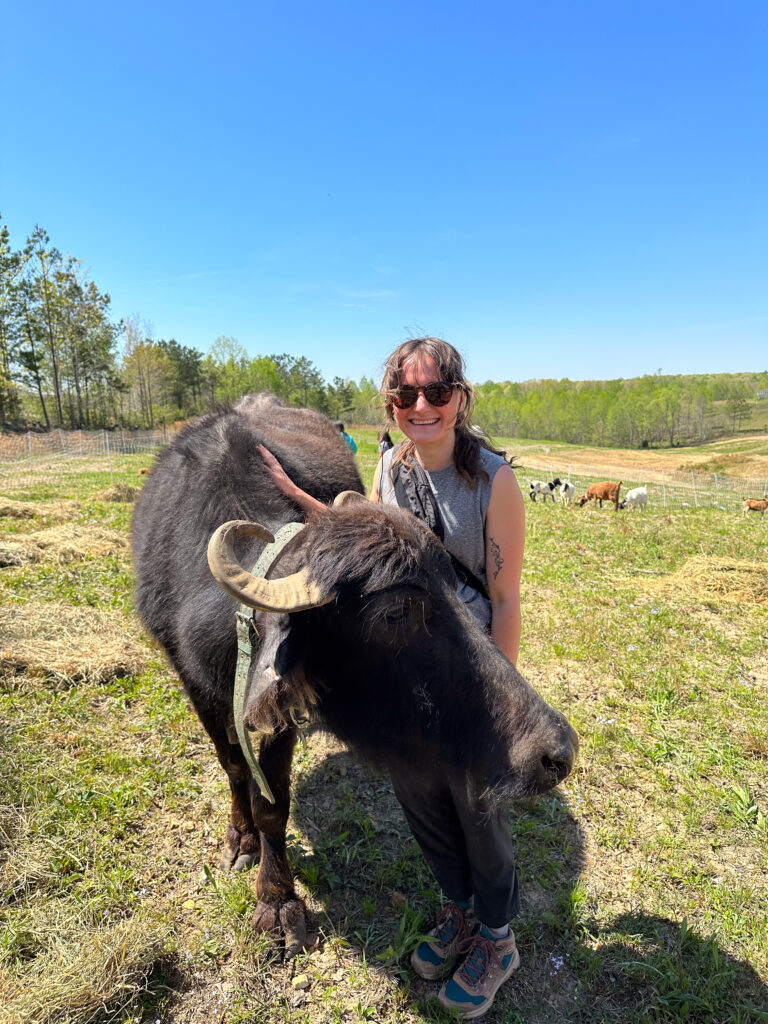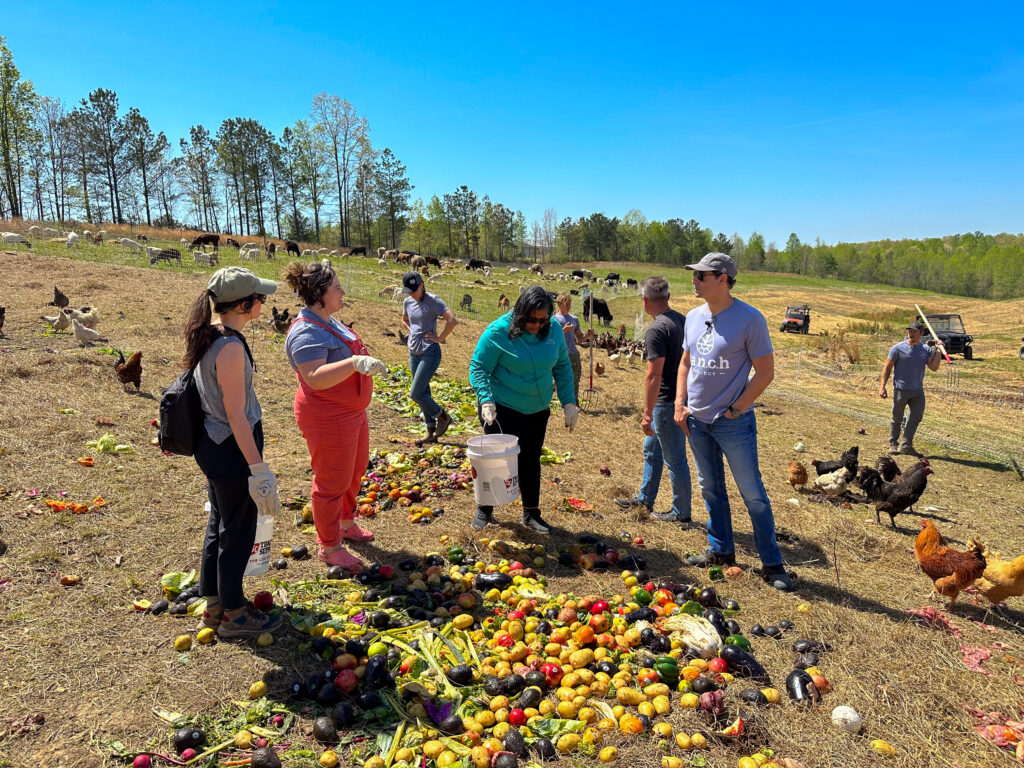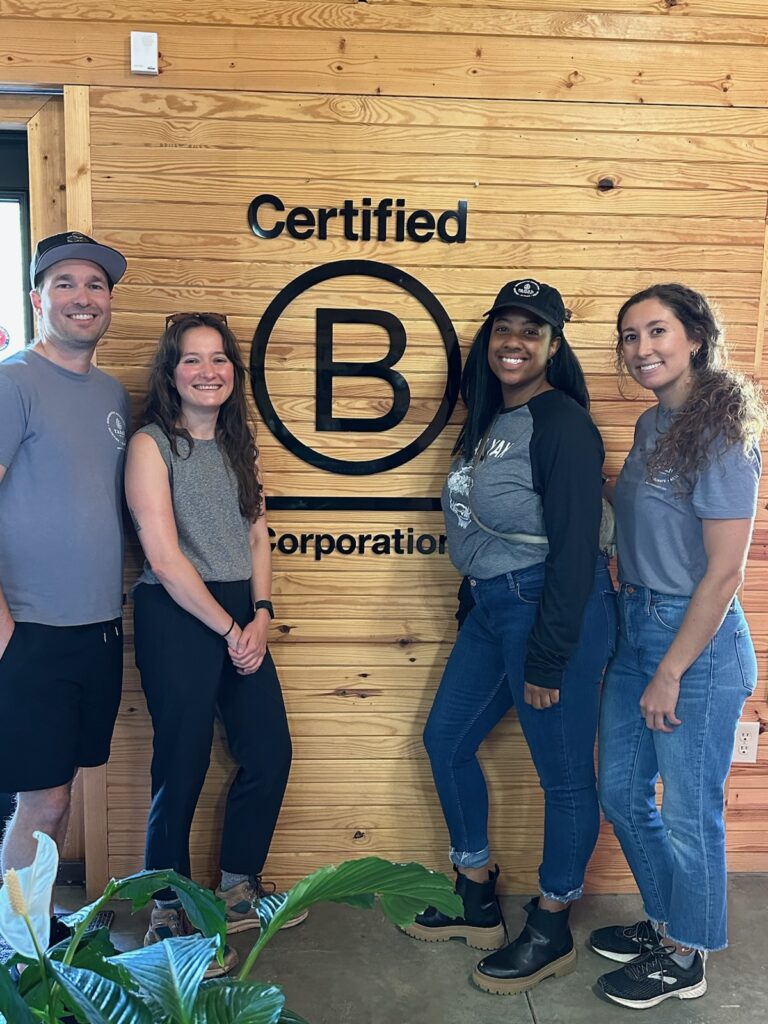In April, I (Jackie, Assistant Director of Workplaces) had the privilege to attend Ancient Nutrition’s R.A.N.C.H Project Field Day. Located in Summertown, TN just over an hour outside of Nashville, the sprawling 133 acres are dedicated to the tenets of regenerative organic agriculture. Ancient Nutrition, the company behind it all, is also Tennessee’s newest B Corporation and member of B Tennessee.
As a supplement company, Ancient Nutrition relies heavily on some of nature’s most potent superfoods, which are only as healthy as the way they’re grown. As a result, 1% of the company’s revenue goes directly to the R.A.N.C.H Project, which stands for Regenerative Agriculture, Nutrition, and Climate Health.

What is Regenerative Agriculture?
Regenerative agriculture goes beyond organic; it’s a collection of practices that support the entire food ecosystem, from the microbes in the soil to the person harvesting. Many methods in regenerative agriculture are credited to ancient indigenous practices of stewarding the land.
These practices are the antithesis of industrial farming, which is a direct driver of climate change.
To verify and credit those who adhere to regenerative organic principles, the Regenerative Organic Alliance, a nonprofit, created the Regenerative Organic Certification with partner organizations Patagonia, Dr. Bronner’s, and the Rodale Institute.
There are three core pillars of regenerative agriculture: soil health, animal welfare, and social fairness.
Soil Health
One teaspoon of healthy topsoil contains more than 50 billion microbes that contribute to building a productive environment for growing food and capturing carbon. It’s true! Soil can sequester carbon, making it a powerful tool in the fight against climate change. Practices like using cover crops, implementing rotational grazing for animals, and avoiding harmful pesticides and herbicides help keep the soil as healthy as possible for optimal planet-saving capacity. As the Regenerative Organic Alliance says: farm like the world depends on it.
Animal Welfare
It’s no secret that the animals in the industrial farming system are treated poorly. In a regenerative system, there is a set of rules called the “Five Freedoms” ensuring all animals are raised humanely.
1. Freedom from discomfort
2. Freedom from fear & distress
3. Freedom from hunger
4. Freedom from pain, injury, or disease
5. Freedom to express normal behavior
At the R.A.N.C.H, it’s pretty clear that the animals are living their best lives. In addition to eating tasty food waste from local grocery stores that would otherwise go to landfills, the animals co-exist as a “flerd” or flock-herd hybrid and graze rotationally to fertilize different plots of the land.
Social Fairness
Farmworkers at the R.A.N.C.H Project and all Certified Regenerative Organic Farms are making a living wage and given a safe work environment that ensures transparency and no forced labor. At the farm, everyone I spoke to was thrilled to be a part of such an exciting movement in the agricultural sector. From passionate goat wranglers to marketing specialists, everyone involved in the project was incredibly knowledgeable and transparent with us.
Top Takeaways
1. Innovation is Key
One unique initiative I saw at the farm is their Feed to Seed program. Since its launch in 2021, they’ve collected more than 542,000 pounds of food waste from local grocery stores and used it to feed animals. They also used the food waste to build a seed bank by physically extracting and planting seeds from “waste” like pomegranate, jackfruit, jalapeno, garlic, papaya, and more.
Tackling complex issues like climate change and food waste can seem daunting. But in many ways, it’s about returning to basics at scale. Feeding animals food scraps and replanting seeds eliminates waste and closes the loop, but it’s not necessarily a new idea.

2. Investigate Supply Chains
As consumers, it can be so easy to distance ourselves from where our products come from. Things like ingredients in packaged food, cotton for bedsheets, or wool for sweaters all come from farms, and it matters how that farm operates. In an ideal world, all companies would be as transparent as Ancient Nutrition, and consumers would have the necessary tools to make informed decisions. One resource to use when searching for anything from legal services to pasture-raised eggs, cheese, or personal care products, is the B Corp Directory. Supporting a B Corp takes the guesswork out of consumer choices and guarantees that rigorous social and environmental standards were met.
3. Sustainability Beyond the Farm
Seeing the behind-the-scenes sourcing for the raw ingredients used in Ancient Nutrition’s supplements was incredible, but the work doesn’t stop there. The company is also on a mission to reduce its environmental footprint in manufacturing, distribution, and consumer use.
One example of this is their packaging initiative. Ancient Nutrition seeks to reduce company-produced plastic and waste by a minimum of 25% while transitioning to more sustainable packaging and marketing material solutions. In their 2022 Impact Report, you can learn more about those initiatives and the organization’s Sustainable Development Goals.
Product or service-based companies can take a page from Ancient Nutriton’s book, even if it’s just one small initiative at a time. Curbing waste, switching to more reliably recyclable packaging, or becoming carbon neutral are all ways to make climate-saving decisions in the workplace.
Closing Thoughts
It’s amazing to see how sustainability work is happening in our state and community. I’m grateful to Ancient Nutrition for opening its doors to educate and share this impactful, climate-saving work. Stay in the loop with all things sustainable business by joining our B Tennessee newsletter.
Photos courtesy of Ancient Nutrition.


Jacqueline Goodwin is the Assistant Director of Workplaces at Urban Green Lab. She oversees the Urban Green Lab Certification Program and the Nashville Sustainability Roundtable. More…